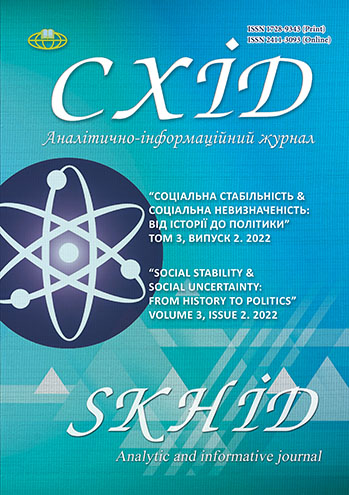Transsociality as uncertainty or incertitude of the human condition
DOI:
https://doi.org/10.21847/1728-9343.2022.3(2).263743Keywords:
sociality, transsociality, humanism, transhumanism, human condition, modern society, postmodern society, changing times, uncertaintyAbstract
Uncertainty, dynamism of transformations, liquid and incertitude are the leading features of the present age, through which time, society, and human situation are increasingly defined. This work examines the interrelationships between human position and social change in traditional, modern, and postmodern societies. The “social – personal” system is considered in the context of changes in the understanding of the humanistic attitude. Thus, the humanism of pre-modern society is particular, i.e. limited to belonging to a certain group, whose virtues are nurtured and formed through education. The sociality of traditional society is natural, rooted in the idea of the divine, and it aspires to the transcendent. In return, modern sociality is constructed around an exclusive humanism that excludes the transcendent, for which only the human matters are important. The sociality of postmodern society is correlated with the spread of antihumanism and transhumanism, both of which overcome the boundaries of the abstract idea of the universal human subject in different ways. One of them is focusing on the phenomena beyond the human nature, and the other one is oriented toward its improvement. The goal of the second approach is to use new technologies to overcome death, aging, and suffering which also applies to all living things beyond humanity.
In crisis periods of changes in the type of sociality, uncertainty and insecurity increase, which is analyzed in two paradigms. A resource-oriented view of the history of mankind shows the modern improvement of the human condition, focusing on the further development of the state’s human capital (plasticity, adaptability, stress resilience, creativity, cognitive and emotional abilities of individuals). The defined position of consideration differs from the consideration of a person in pre-modern and modern societies, when a person was a physical resource and social capital. A problem-oriented approach analyzes signs of crises and dangers, foresees possible options for the development of events, and warns of possible disasters in order to be protected from them. Thus, the analysis of the crisis of sociality indicates the emergence of its new multiple forms, which are formed both by dispersal and by going beyond the boundaries of human communities, which allows describing new forms of sociality through the concept of transsociality.
Downloads
References
Bauman, Z. (2000). Liquid Modernity. Cambridge, Pollity Press.
Bauman, Z. (2001). The Individualized Society. Cam-bridge, Polity Press.
Bauman, Z. (2007). Liquid Times. Living in an Age of Uncertainty. Cambridge, Polity Press.
Florida, R. (2019). The Rise of the Creative Class. New York, Basic Books.
Harari, Y. N. (2011). Sapiens: A Brief History of Human-kind. Toronto: McClelland & Stewart.
Heidegger, M. (1977). Letter on Humanism. New York: Harper & Row.
Kahneman, D. (2011). Thinking, Fast and Slow. London: Penguin Books.
Latour, B. (2020). What is the world like after the pan-demic? In: Bruno Latour, Eva Illuz, Jean-Luc Nan-cy. Political criticism: https://politkrytyka.org/2020/03-/31/yakyj-svit-pislya-pandemiyi-bruno-latur-yeva-illuz-zhan-lyuk-nansi/ (In Ukrainian)
Mellander, Ch., Florida, R. (2007). The Creative Class or Human Capital? Explaining Regional Development in Sweden. https://www.researchgate.net/publication/50-94399_The_Creative_Class_or_Human_Capital_Explaining_Regional_Development_in_Sweden
Pinker, S. (2018). Enlightenment Now: The Case for Reason, Science, Humanism, and Progress. New York: Penguin Books.
Rosling, H. (2018). Factfulness: Ten Reasons We’re Wrong About the World – and Why Things Are Better Than You Think. New York: Flatiron Books.
Schwartz, R.C., Sweezy, M. (2020). Internal Family Sys-tems Therapy. New York: The Guilford Press.
Taleb, N. N. (2007). The Black Swan: The Impact of the Highly Improbable. New York: Random House Trade Paperbacks.
Taylor, Ch. (2007). A Secular Age. Cambridge, Harvard University Press.
Taylor, Ch. (2013). A Secular Age. Kyiv, Duh & Litera (In Ukrainian).
Tillich, P. (2014). The Courage to Be. New Haven, Yale University Press.
Downloads
Published
How to Cite
Issue
Section
License
Copyright (c) 2022 Віталій Лях, Марина Лукашенко

This work is licensed under a Creative Commons Attribution-NonCommercial-NoDerivatives 4.0 International License.
1. Authors bear responsibility for the accuracy of facts, quotations, numbers and names used.
2. Manuscripts are not sent back.
3. The publisher does not always agree with the authors' opinion.
4. The authors reserve the right to authorship of the work and pass the first publication right of this work to the journal under the terms of a Creative Commons Attribution-NonCommercial-NoDerivatives 4.0 International License. This license allows others to distribute (copy) the published work for non-commercial purposes, provided there is mandatory attribution to its authors and a link to the first publication in our journal.
5. The authors have the right to conclude separate supplement agreements that relate to non-exclusive work distribution in the form in which it has been published by the journal (for example, to upload the work to the online storage of the journal or publish it as part of a monograph), provided that the reference to the first publication of the work in this journal is included.

